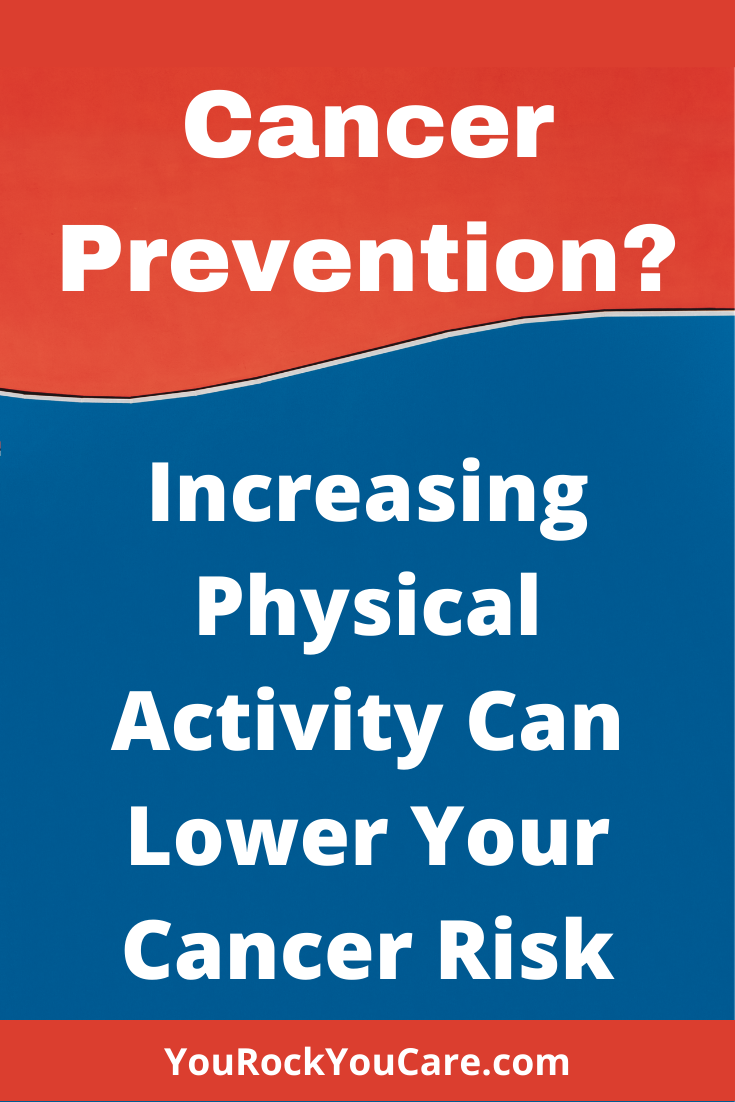Decades of research have shown that increasing physical activity can be useful for cancer prevention.
Cancer is the second leading cause of deaths in the United States, according to the Center for Disease Control and Prevention (CDC). More than 1.6 million people in the U.S. are diagnosed with cancer each year.
Cancer is the second leading cause of death globally, according to the World Health Organization (WHO). It’s responsible for an estimated 9.6 million deaths in 2018. About 1 in 6 deaths worldwide is due to cancer.
Around one third of deaths from cancer are due to the 5 leading behavioral and dietary risks: lack of physical activity, high body mass index, low fruit and vegetable intake, tobacco use and alcohol use.

Studies have shown that being sedentary increases cancer risk. In contrast, increased physical activity decreased cancer risk, including risk for breast and colon cancers as well as stomach, esophageal, kidney and endometrial cancers.
Increasing your physical activity a part of your lifestyle can decrease your risk of cancer as well as risk for chronic diseases, such as, heart disease and diabetes.
Moderate to vigorous physical activity is any exercise that makes your heart beat faster. It includes walking, swimming, cycling or running. A growing body of research have shown that doing any kind of physical activity to avoid too much sitting can help lower cancer risk.
Cancer Prevention: Increasing Physical Activity Can Lower Cancer Risk
There is strong evidence that higher levels of physical activity are linked to lower risk of several types of cancer, according to the National Cancer Institute.
Colon cancer — Studies have shown that people who exercise regularly appear to have a lower risk of developing colon cancer. Those who exercise regularly have a 40% to 50% lower risk of colon cancer compared with those who are less physically active. People who are active their entire lives appear to have the lowest risk of colon cancer.
Breast cancer — Long-term studies have shown that women who engage in moderate to vigorous exercise for more than 3 hours per week have a 30% to 40% lower risk of breast cancer. Reduction in breast cancer risk appears to apply to all women, regardless of family history or risk of breast cancer.
Endometrial cancer (cancer of the lining of the uterus) — Studies have shown that highly physically active women had a 20% lower risk of endometrial cancer than women with low levels of physical activity.
Stomach cancer — Studies have shown that people who were the most physically active had a 19% lower risk of stomach cancer than those who were least active.
Esophageal cancer — Studies have shown that individuals who were most physically active had a 21% lower risk of esophageal adenocarcinoma than those who were least physically active.
Kidney cancer — Analysis of over 1 million individuals found that leisure-time physical activity was linked to a 23% reduced risk of kidney cancer.
Cancer Prevention Strategies: How Does Physical Activity Lower Risks of Cancer?
What are the biological effects of physical activity on the body which may be associated with lower cancer risks? Physical activity decreases factors associated with cancer development and progression, including:
- Lowering the levels of growth factors and sex hormones (such as, estrogen)
- Preventing high blood levels of insulin
- Reducing inflammation
- Improving immune system function
- Changing the metabolism of bile acids, which decrease exposure of the gastrointestinal tract to these suspected carcinogens
- Decreasing the time it takes for food to travel through the digestive system, which decreases exposure of the gastrointestinal tract to possible carcinogens
- Preventing overweight and obesity.
Physical Activity Can Help With Cancer Prevention By Helping Prevent Obesity and Being Overweight, Which Are Risk Factors For Many Cancers
People who are overweight, obese or morbidly obese are at greater risk for many diseases, including diabetes, high blood pressure, cardiovascular disease, stroke and many cancers. The types of cancer with increased risk due to excess weight include:
- Breast cancer
- Esophageal adenocarcinoma
- Liver cancer
- Kidney cancer
- Pancreatic cancer
- Colorectal cancer
- Gallbladder cancer
- Ovarian cancer
- Thyroid cancer
- Multiple myeloma (cancer of the plasma cells, a type of white blood cell in the bone marrow)
- Endometrial cancer (cancer of the uterine lining)
- Gastric cardia cancer (cancer of the upper part of the stomach)
- Meningioma (slow growing tumor from the membranes surrounding the brain and spinal cord)
Cancer Prevention Tips for Americans Too Busy to Increase Their Physical Activity
Studies have shown that being sedentary increases cancer risk. In contrast, increased physical activity decreased cancer risk.
The problem is that many Americans lead a sedentary lifestyle.
Even the ones who exercise daily spend the majority of their day being inactive. Instead of being more physically active at home or at work, people often sit and work using their computers. Instead of exercising, people often watch television, play video games or surf the Internet to relax.
Most Americans are too busy people to exercise. They usually don’t have a lot of time or energy for increased physical activity. They are too exhausted to exercise after a stressful day at work or after a long commute.
What’s the solution?
In order for busy people to increase their physical activity, the strategy needs to be easy-to-do regularly.
NEAT movements may be solution. Non-exercise activity thermogenesis (NEAT) are small movements, such as, tapping your feet, stretching your legs or standing. Increasing physical activity is essential for a healthy metabolism.
These short bursts of exercise throughout the day can burn as many as 500 extra calories a day or even more. NEAT can be the easy way for busy people to increase their physical activity. Increasing NEAT levels can lead to lasting weight management… which can lower risk of cancer.
Increasing physical activity by increasing NEAT movements can help with cancer prevention for people too busy to exercise.
